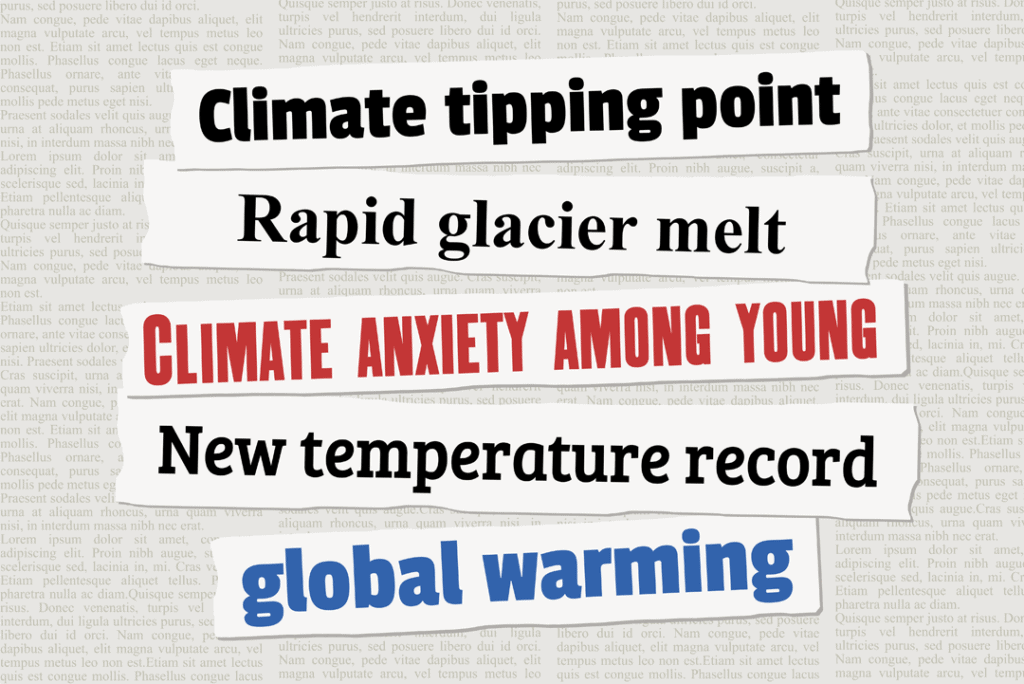
Climate change is already taking place. So is climate anxiety among people.
What is climate anxiety?
Climate anxiety (or eco-anxiety) arises from worrying about climate change and its effects on our daily lives. It affects our mental health and could lead to depression, difficulty in concentrating, increased stress levels or behavioral disorders. It could be caused directly by climate change (for example extreme heat, floods) or indirectly through issues caused by climate change (for example climbing energy prices or water shortages).

Young people have been particularly affected by this phenomenon. A medical journal research study surveyed 10,000 people aged 16-25 years in ten countries about climate change. It found that 59% were extremely worried while 84% were at least moderately worried. 45% of those surveyed were worried to the point of struggling with daily functional life. [1]
Young people however are not the only ones affected. As per a UK research, older people are also increasingly worried about climate change. [2]
How does climate anxiety affect organizations?
People are the heart and soul of business organizations. When climate anxiety affects mental health of employees, it affects their performance and hence that of the organization. Employees could feel hopeless and disengaged at their workplace. Even business leaders can feel hopeless in the face of disruptions brought on by climate change, which affects their ability to take decisions. Moreover, climate change poses economic costs for businesses which affect day to day operations as well as long term goals.

How can organizations deal with climate anxiety?
Firstly, employees should recognize that having climate anxiety is absolutely normal. They should validate their feelings and concerns. They should share their feelings with fellow colleagues. Organizations should prioritize employees’ mental health and factor in climate anxiety when evaluating climate risks in their business strategies.
Secondly, the best way to tackle climate anxiety is to take action in addressing climate change problems.

How can organizations transform climate anxiety into purpose and action?
Employees and organizations should adopt a solution oriented mindset. It needs to be understood that there are solutions for problems posed by climate change which we can work towards.
Employees should start with gradually making lifestyle changes which can reduce their own carbon footprint.
Employees can raise awareness of climate change and encourage others to think about what they can do to alleviate this issue. No individual effort is too small to make a difference. It is important to keep talking about climate change and that we can make a difference.

On an organizational level climate anxiety can be transformed into purpose and action by incorporating sustainability in the business strategy.
Organizations can set goals which are aligned with United Nations’ Sustainable Development Goals (SDGs) and regional/international Climate target plans. These goals will guide organizations in working towards positive Environmental action. Existing solutions in renewable energy, emissions reduction and responsible sourcing can be utilized towards accomplishing these goals.

Horizon had embedded climate action in its business strategy even before the adoption of the Paris Agreement. Implementing various initiatives to reduce GHG emissions led us to achieve a reduction of 82% – much ahead of the 2030 EU Climate and Energy Targets. Investing in renewable energy production as an alternative to fossil fuels early on has led us to achieve an 80% renewable energy share of total energy consumed in production – much ahead of the 2030 EU Climate and Energy Targets. Such action makes our employees look forward to their work in contributing towards our fight against climate change.
To conclude
Climate anxiety is a growing concern and should be validated. The best way for people and organizations to overcome this anxiety is to lead lives and businesses with positive climate action.
References:
[1] Marks, Elizabeth and Hickman, Caroline and Pihkala, Panu and Clayton, Susan and Lewandowski, Eric R. and Mayall, Elouise E. and Wray, Britt and Mellor, Catriona and van Susteren, Lise, Young People’s Voices on Climate Anxiety, Government Betrayal and Moral Injury: A Global Phenomenon. Available at SSRN: https://ssrn.com/abstract=3918955 or http://dx.doi.org/10.2139/ssrn.3918955
[2] Helm, T., 2021. Eco-anxiety over climate crisis suffered by all ages and classes. The Guardian, [online] Available at: https://www.theguardian.com/environment/2021/oct/31/eco-anxiety-over-climate-crisis-suffered-by-all-ages-and-classes [Accessed 7 October 2022].
